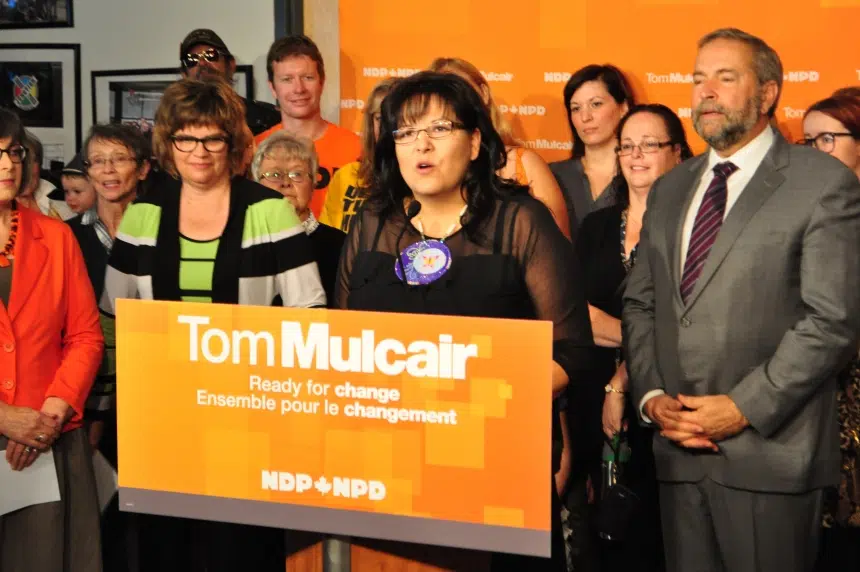As federal New Democratic Party (NDP) leader Thomas Mulcair announced his plan to address violence against women in Saskatoon on Monday, Federation of Saskatchewan Indian Nations (FSIN) Interim Chief Kimberly Jonathan was by his side.
Chief Jonathan led Mulcair into the event and spoke about the importance of addressing the issue of missing and murdered indigenous women before the action plan was announced, but maintains the FSIN is nonpartisan.
“FSIN, all peoples, are standing behind those who want to give respect to First Nations people and who want to listen to our issues,” Jonathan said after the event.
“We have to, as an organization, remain nonpartisan and we have to ensure that everyone has the right to vote and support in whatever way they need to.”
The FSIN represents 74 First Nations in Saskatchewan. Jonathan said she received a personal invite from Mulcair in advance of the announcement, adding she did not receive a similar invitation from Liberal leader Justin Trudeau when he was in Saskatoon on Aug 13.
Jonathan said the NDP announcement to bring back the Shelter Enhancement Program and the continuing commitment for an inquiry in missing and murdered indigenous women within the first 100 days of government was a step in the right direction.
“We are looking forward to insuring that that respect be provided, not only to the 1,200 women (who have been murdered or who have gone missing) … but also all those women who are just trying to breathe daily,” Jonathan said.
“With the promises today of the inquiry, we are going to unravel, and not only for our First Nation and indigenous women, but society is going to be able to unravel and see the realities, the underlying issues of what we face.”
Jonathan said she would still like to see party platforms concerning child welfare, education disparity, housing, and issues with non-insured health benefits.
Métis Nation Saskatchewan (MN-S) President Robert Doucette also stopped by to listen to the announcement. He said the continued commitment to an inquiry and an investment into women’s security will have an impact on aboriginal voters.
“Not only as the leader of the MN-S but more importantly being a father and a grandfather to three daughters and two granddaughters, and also a brother to a sister who was found hanging in her jail cell in Kingston Prison, I think this is long overdue,” Doucette said.
“It’s important for not only non-aboriginal women but for First Nation, Métis, and Inuit women to know that their lives matter and that they are an integral part of this community and they are important to the health of this community.”
Doucette said that he would have liked to hear more in regards to the party platform around poverty and educational disparity for aboriginal people in Canada.
“The one thing that Tom Mulcair should have said was that when the education of First Nations, Métis, and Inuit women go up, so does their power to create wealth for their families and wealth for their communities,” he said. “That’s a really important aspect of it that I think he should have talked about.”
Doucette has, so far, not taken a stand with any party leaders as they stop through Saskatchewan on the campaign trail.
“I haven’t heard Harper saying anything about Métis issues. Justin Trudeau kind of mentioned it a little bit. I am waiting for Thomas Mulcair to come out with their policy platform for Métis,” Doucette said.
“There are 100,000 Métis people living in the province of Saskatchewan. We are one of the fastest growing demographics in this province, and the most important thing is we are taxpayers … I’m waiting to hear one of the parties talk about what they are really specifically going to do to help Métis people of this country.”







